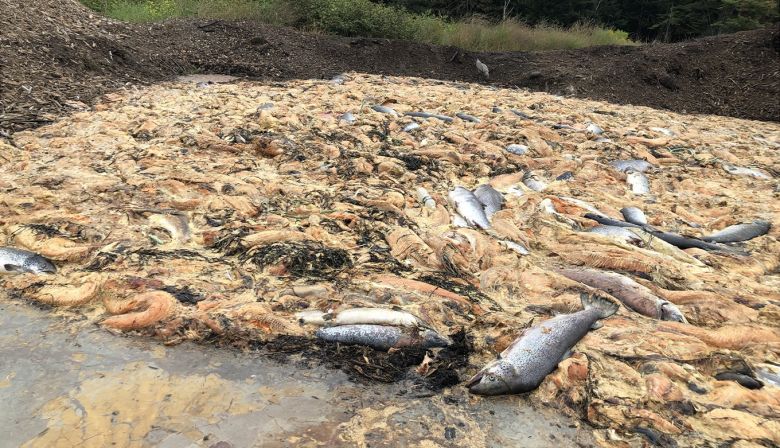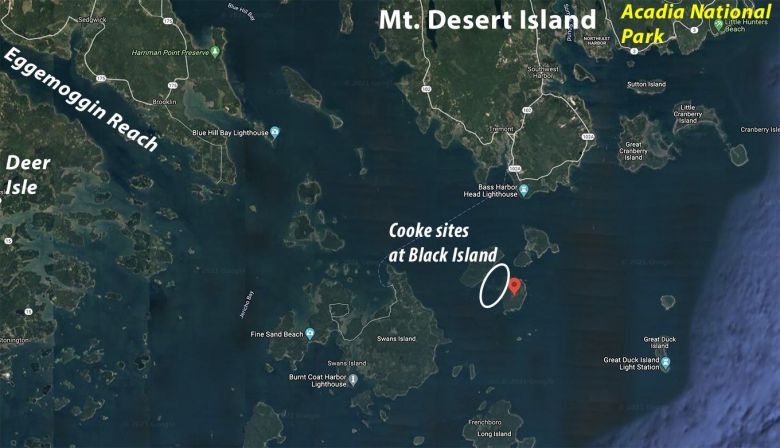“These fish are were adults that have been on these sites for at least 24 months. Cooke staff have no explanation for what caused the die-off of fish other than it was likely due to the low DO’s. They have no definitive explanation for what caused the low DO’s in the affected pens. They reportedly did not see anything out of the ordinary prior to this event and it caught them by surprise.
“There were no fish to collect as the last mortalities were shipped to a compost site (Gott’s) in Tremont on Friday, August 27th.”
Protect Maine’s Fishing Heritage Foundation (PMFHF), along with other members of Frenchman Bay United, a coalition opposing plans for a massive industrial salmon farm in Frenchman Bay near Acadia National Park, recently sent a letter to Department of Marine Resources (DMR) Commissioner Patrick Keliher with a list of questions that the groups believe need answers, given the severity and magnitude of the fish die-off.
The Black Island pens near Frenchboro are owned by Cooke Aquaculture, the largest holder of industrial-scale fish farming leases in the state, with more than 600 acres. Over the years, the company has been cited and paid millions of dollars in fines for numerous violations in Washington state, Maine, and New Brunswick.
PMFHF Executive Director Crystal Canney said: “Among some of the more serious questions are what caused this, how did state agencies respond (or not respond), and what are the impacts on waters around the pens? Maine people, especially local fishermen and those who live and work in this area deserve an answer.”
Frenchman Bay United, an umbrella organization of five different groups opposing plans by American Aquafarms to put 30 salmon pens in Frenchman Bay, said the die-off is just another example of how industrial-scale in-water fish farms threaten the environmental and economic health of coastal areas.
“At a time when foreign investors are trying to get approval to put one of the world’s largest in-water salmon farms in the pristine waters right next to Acadia National Park, this die-off raises many serious questions about the threats posed by these industrial-scale farms and the state’s ability to regulate and monitor them,” said Ted O’Meara, a Frenchman Bay United board member.
Canney added: “Lobstermen and women have testified at hearings that dead lobsters have been found near Cooke pens in Jonesport, and the company has been operating without an updated discharge permit. At every turn, industrial-scale aquaculture is given the benefit of the doubt, whereas lobstermen and fishermen have their feet held to the fire. We need evidence that Maine’s oversight agencies are putting the health of our waters first, and not turning a blind eye to industrial-scale aquaculture damaging our oceans. This is why the answers to our questions about this die-off are so important.”
The emails, obtained through Maine’s Freedom of Access Act, also show the confusion between the state’s dueling agencies, environmental protection and marine resources.
“Is there a protocol in place for one department to talk to another, in this case DMR to notify DEP, when salmon or other aquaculture die offs occur?” asked the group. “To summarize from media reports the communications director indicated it was not the responsibility of DMR to notify DEP.”
Loughlin first assumed the company alerted DEP about the die-off immediately. “Looking over my notes from your call, it looks like the crew found the fish dead this morning,” Loughlin wrote to Robinson on Aug. 27. In fact, the crew found the fish dead Monday Aug. 16.
“Having maybe 100,000 fish die off overnight is a pretty serious event, environmentally speaking,” Loughlin wrote.
https://theqsjournal.substack.com/p/breaking-news-emails-reveal-100000

